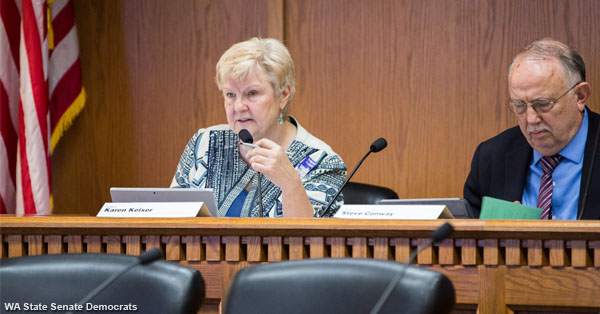OPINION
Halftime report: We’re making progress for workers in our state
By SEN. KAREN KEISER
(Feb. 12, 2020) — It’s halfway through this year’s short, 60-day session, and I want to report to you that the state Senate has been moving forward with a strong agenda for Washington’s workers. As chair of the Senate Labor & Commerce Committee, I have been working with my colleagues to raise workplace standards and increase collective bargaining rights in innovative ways in both private- and public-sector employment. I wanted you to have a halftime report on bills we passed out of our committee before the committee cutoff deadline this session.

The cannabis sector, as a young and highly regulated industry, provides an opportunity not only to set high workplace standards but to devise new, more effective methods to incentivize businesses to live up to them. SB 6393 would establish a point scale for cannabis employers’ licensure. Policies that are fair to workers—like providing health care, a living wage, safety and health standards, and a collective bargaining agreement or an open attitude toward labor organizations—would give businesses more points and strengthen their case for retaining their licenses. This is a “new idea” here in Washington, but similar laws have been implemented in other states, and I believe it is important to open the discussion on how to achieve higher workplace standards in this very new industry.

In the public sector, we’re taking seriously the responsibility we have to make sure state contractors are adhering to fair workplace standards. SB 6096 would require the state Department of Social and Health Services to consider the potential for labor law violations when contracting with service providers. This means that in order to contract with the state, businesses have to respect employees’ rights under the law.
We’re also expanding collective bargaining rights in the public sector. Administrative law judges, who ensure that Washingtonians who interact with our state agencies get due process, have long been left out of rules that allow state employees the right to collective bargaining. SB 6224 would correct that by authorizing collective action.

Family caregivers—who are disproportionately women—are also put in a bind by the way our unemployment insurance works. If a caregiver’s employer changes her schedule and she has to quit her job because she can’t find childcare during her new work hours, that is considered a “voluntary” quit and she does not qualify for unemployment insurance. SB 5473 would be the first step toward fixing that problem by analyzing how we can change eligibility requirements to protect caregivers in situations like that while still being responsible stewards of the unemployment trust fund.
There are many other bills that I have sponsored or have been heard and passed by the Senate Labor & Commerce Committee to make our state a better place to work—from the first revision to the plumbing code in 45 years to breakthrough legislation to prevent bid shopping, bills to give domestic workers more rights and a bill to limit farm labor contractors. We have just 30 days left and a lot more work to do. Onward!